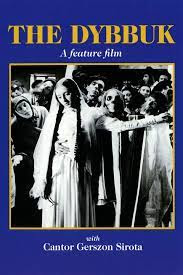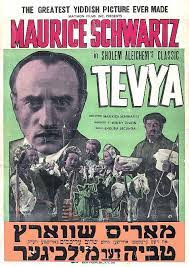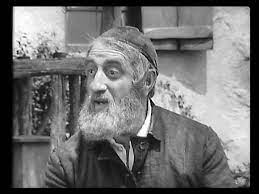The Past is Always Present
Late one night, about a year ago, I watched two Yiddish language captioned movies, “The Dybbuk,” 1938 and “Tevye,” 1939. I found them both interesting and intense.
I really wanted to see these movies because I wanted to hear Yiddish again. My mother and grandmother, who lived next door in Paterson, spoke Yiddish to each other. My maternal grandparents came to America from Poland circa 1905 to escape the pogroms. They spent their honeymoon on a ship crossing the Atlantic Ocean and most likely suffered from mal de mer the entire time. All of their six children were born in Paterson which, of course, included my mother Rose, who was their 5th child.
Since “The Dybuuk” takes place in the Pale of Settlement in Poland I was especially eager to see it. Although it was an imaginative movie, I did not get entirely lost when the Yiddish subtitles were juxtaposed against the many long sleeved white shirts everyone seemed to be wearing. Other than that, I settled in with the movie, even the profound solemness, the long beards, the black hats, the temple scenes and what seemed to me to be ancient ways and rituals.
Soon after, bad thoughts started to creep into my head and I experienced a very dark turn. A cascade of fear and anger overtook me because I knew what was soon to befall these poor souls. Then I saw the father in the movie obsessed with counting his money year after year and to the point of ignoring his motherless daughter. I saw his glee every time the coins were stacked up. When they jangled his face lit up . . . year after year. I realized that this movie was its own worst enemy because of its depiction of Jews as stereotypes characterized as overly obsessed with money and mysticism. I quickly flipped the channel, but, I couldn't hold out for long so I flipped it back after 5 minutes and again the dad was stacking up his coins and folding exceptionally large bills of money. This back and forth went on for two hours.
The plot was that of a young girl, whose mother died in childbirth. She is promised at birth to a young man but her father reneges and marries her off to a rich boy instead. The jilted boy commits suicide and his spirit, called a dybuuk, now possesses the young girl. A dybuuk is a dislocated soul and is spiteful. I strongly believe that if I wasn't sickened by the thought of them on the precipice of the Holocaust, I would have enjoyed it more because it was a very interesting look at a life many of us would have had if our parents and grandparents hadn't come over from Europe to north Jersey well before 1938. It was the stark reality of what was already coming and couldn’t be stopped that I could not shake off. That cloud of disaster darkened the movie, which otherwise would have been a worthy watch. And the money counting was in very poor taste because it played into the anti-Semitic tropes prevalent then and now.
Right after this movie, "Tevye" came on which was a much brighter movie that did not portray Jews in a bad light at all. The story is about a widowed milkman and his daughters. It was written by Sholem Aleichem and was the foundation for what would later become the stage musical “Fiddler on The Roof.” My problem was that it was getting late and I fell asleep at certain intervals during the movie, almost as if I was flipping back and forth as I did in "The Dybbuk," but, this time I didn’t intend to miss anything. It had a special and poignant story-line with quality acting. It takes place in a shtetl in the late 1880's, also in Eastern Europe, and again I felt bad about what was to come, but, in this case the catastrophe would occur fifty years hence. I shifted into another gear and convinced myself that everyone in this story will never know the grim destiny that would befall them or their children and grandchildren. Perhaps their future family would already be living safely in north Jersey by the time the Holocaust ravaged their village. It was easier to watch this way.
Continuing with the movie, Tevye's daughter, Chava, marries a gentile and Tevye sits shiva for her. Tevye is then thrown out of town for the mere fact that he is Jewish. He explains that in all the decades he's lived in this town he has wronged no one and he has been a model citizen; however, the town council has voted and he is "out" nevertheless. His daughter, now a convert and living with gentiles, overhears what has happened and the council has called her father an ethnic slur. She slithers out of the house when everyone is preoccupied, leaving her husband behind. When her husband wakes up he rides up on horseback to Tevye's house professing his undying love for her. She tells him that her mind is made up and states, "We live in two different worlds." Tevye takes her back into his arms after first rejecting her. She is now reunited with her family, her Jewish family. They pack up their meager belongings and their trusty white horse leads the whole family out of town pulling their cluttered wagon with their little white dog scurrying behind. Tevye says, “We are always getting thrown out of everywhere." The movie soon ends. I regretted falling asleep and missing snippets of this movie. The subtitles were okay to read because not too many people were wearing long sleeved white shirts.
No, I do not understand Yiddish but I strongly identify with the sounds of the language and the culture of seeing my mother and grandmother sitting at the kitchen table and discussing the comings and goings of their everyday life.
I was happy to see whatever I could of both movies for different reasons and for a lot of the same reasons. I found their lives back then fascinating because no matter how you slice or dice it, it is all from whence most of us came.
This “double feature" hopefully enlightened you too. I would like to see more of these gripping historical Yiddish productions. To me, they are a reminder that the past is always present. The images below are original posters and stills from the two movies I have just audited.
Dorothy Douma Greene

Dybbuk flyer

Tevya Flyer

Photo of an old world man.
